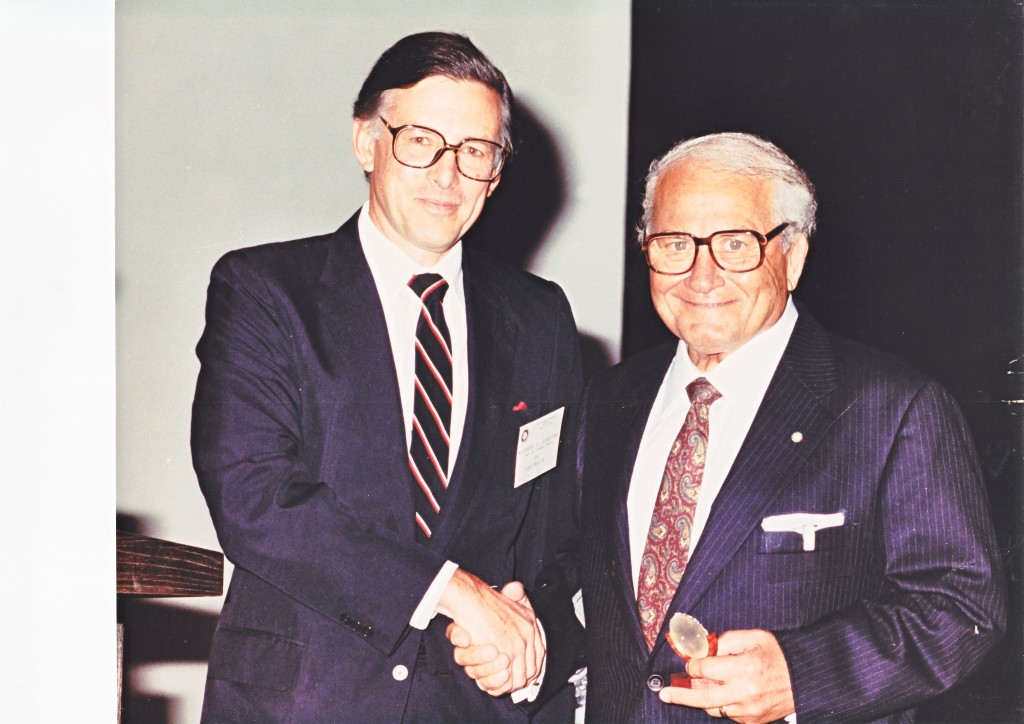By Professor Michael Nicholas and Professor Fiona Blyth AM
As Australian Pain Society (APS) members may have heard, Professor Michael Cousins AO passed away April 27, 2024. Many obituaries have already appeared, and his incredible achievements are well-known in the academic pain and medical worlds. Many readers will have gained fleeting impressions of him at conferences and meetings, in the media, as well as in the pain and anaesthesia literature, but fewer have worked alongside him for an extended period, and we hope this account from two of us who have will provide a closer perspective on Michael as a clinician, researcher, teacher, leader, collaborator, medical politician, fund raiser ‘extraordinaire’, and colleague. It is fitting that this perspective should appear in the Australian Pain Society’s acknowledgement of Michael.
In our view, one of Michael’s most remarkable characteristics was his ability to convert dreams into realities – realities most of us mere mortals considered dreams. He didn’t do this alone, of course, but he was always in the vanguard. Consider these achievements:
- With Sir Sydney Sunderland and Dr Connie Peck, Michael played a key role in establishing the Australasian Chapter of the IASP in 1978 and the creation of the APS, of which he was the founding President (1979-80).
- A decade later he became IASP President (still the only Australian to have achieved this).
- Michael was instrumental in bringing the IASP World Congress to Australia (Adelaide) in 1990, another first.

- He was the founding Professor of two university departments of Anaesthesia and Intensive Care/Pain management (Flinders, SA in 1975 and Sydney, NSW in 1990), and with the help of like-minded clinical colleagues he established multidisciplinary pain management centres at the Flinders Medical Centre in 1976 and the Royal North Shore Hospital (RNSH) in 1990.
- Even before his arrival at RNSH in 1990, he envisaged the existing pain clinic as evolving into an entity similar to the original University of Washington Hospital pain management centre where Bonica, Loeser, and Fordyce had led the development of multidisciplinary pain management in the 1970’s and 80’s. He renamed the pain clinic at RNSH as the Pain Management and Research Centre (PMRC). Fittingly, prior to his retirement, it was again renamed to the Michael J Cousins Pain Management and Research Centre.
- In 1995 he extended the role of the PMRC to incorporate post-graduate education within the Sydney Medical School. He launched this as the University of Sydney Pain Management Research Institute (PMRI) and, with colleagues at PMRC/PMRI and the University of Sydney, in 1996 he launched the world’s first post-graduate university course in multidisciplinary pain management. This program was later recognised by IASP as consistent with its interprofessional pain curriculum, and it continues to this day in an online format. To date, it has produced over 800 graduates from Australasia and beyond.
- In 1998, the institute was recognised by the National Health and Medical Research Council as one of only eight Centres of Clinical Excellence in hospital-based research, and in 2012 the NSW Ministry of Health named it as the lead site for pain research and education in the state.
- In conjunction with colleagues at the Australian and New Zealand College of Anaesthetists (ANZCA) and other medical colleges, he played a leading role in the establishment of the world’s first Faculty of Pain Medicine (FPM), serving as the founding Dean from 1999-2002.
- His commitment to training the pain medicine physicians of the future saw him not only act as editor of three editions of the text Neural Blockade and Pain Management which has become a key reference internationally, but also facilitate and mentor pain medicine training for many anaesthetists at PMRC who have gone on to play leading roles in the FPM and pain medicine generally in Australia and Southeast Asia. Some have also followed his footsteps onto the Council of IASP. The lasting impact of his mentorship for pain medicine physicians and their patients in our region cannot be underestimated.
- In 2008 the APS proudly recognised Michael Cousins as a Distinguished Member
- In 2010 he led collaborators from around Australia in the creation of Australia’s (and the world’s) first National Pain Summit, a key event in the history of pain in Australia. This subsequently led to the establishment of Painaustralia as well as the Pain Management Network within the Agency for Clinical innovation, NSW Ministry of Health in 2013.
- He went on to chair the first International Summit on Pain (representing 68 countries) in Montreal, Canada, and this led to the publication of the Declaration of Montreal, proclaiming access to pain management to be a fundamental human right. This declaration is now embodied internationally as a key platform for all pain societies.
To achieve even one of these outcomes would be considered quite enough for most of us, but after working with him for over 20 years, we can truly say Michael Cousins had no peer. All of us in the APS, and uncounted numbers of people living in pain around the world, are in his debt and we mourn his passing. We should not forget the extraordinary contribution of Michael’s family, in so many ways, they made Michael’s achievements possible. We honour them as well.







